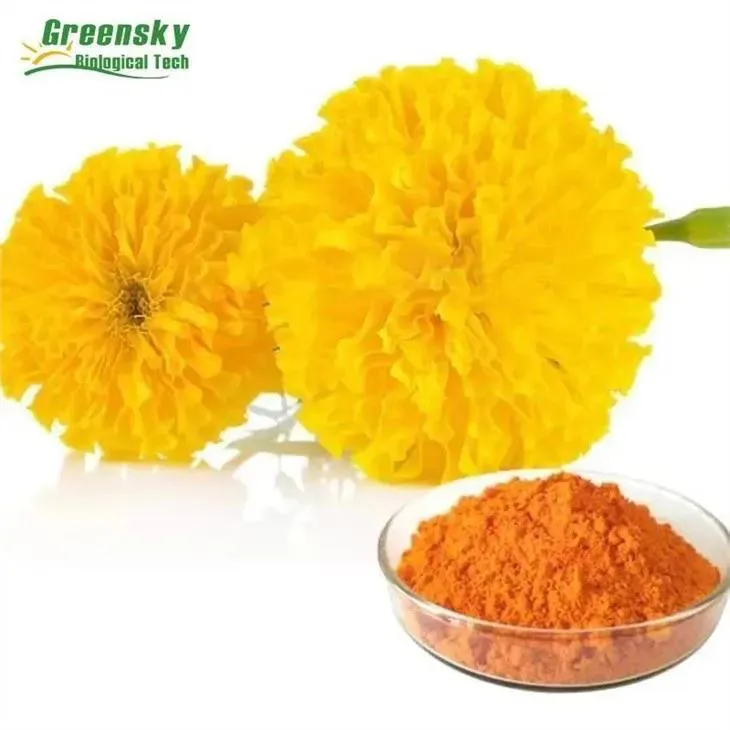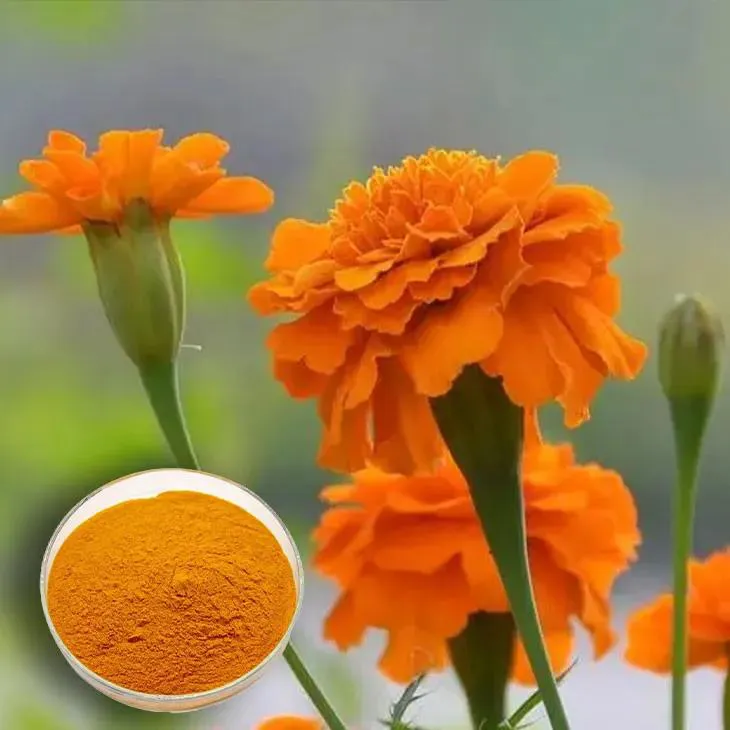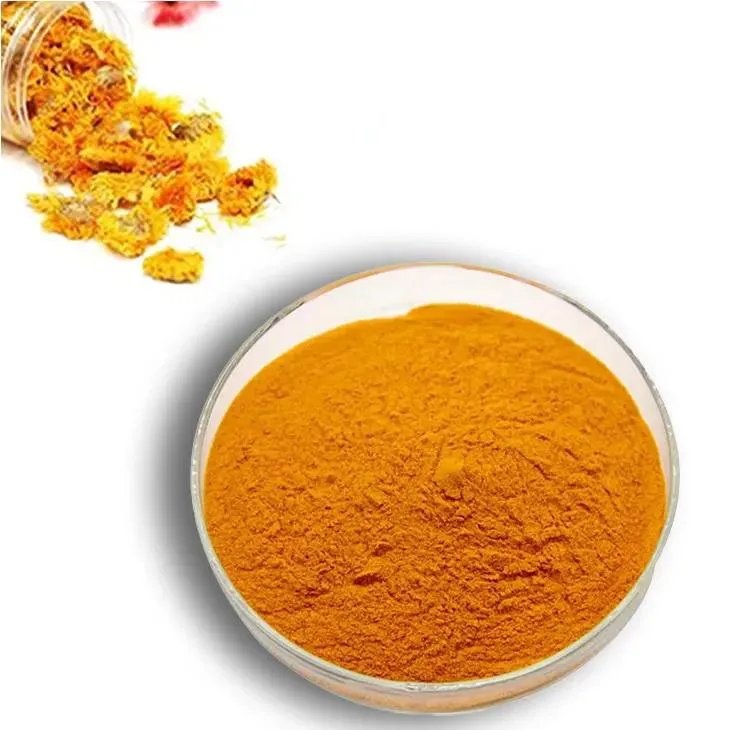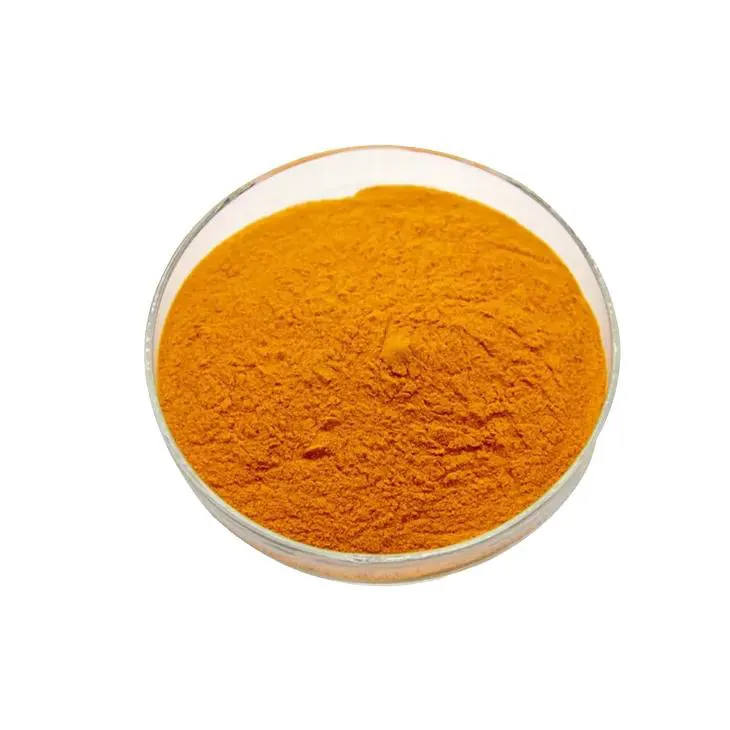- 0086-571-85302990
- sales@greenskybio.com
Organic non - transgenic Marigold Extract.
2024-11-30

1. Introduction
The organic non - transgenic Marigold Extract is a remarkable natural resource that has found a wide range of applications. Marigolds, which are widespread and seemingly ordinary plants, hold extraordinary potential when organically grown and non - transgenic. The resulting extract has a host of unique qualities that make it highly valuable in various industries.

2. Key Components: Lutein and Zeaxanthin
Lutein and zeaxanthin are the standout components within the organic non - transgenic Marigold Extract. These are types of carotenoids, which play crucial roles in human health and also possess significant commercial value.
2.1 Importance for Human Health
These carotenoids are essential for maintaining good health. They are known to have a positive impact on eye health, for example, helping to protect against age - related macular degeneration. Additionally, they may contribute to overall cardiovascular health and play a role in antioxidant defense mechanisms within the body.
2.2 Commercial Value
In the commercial realm, the presence of lutein and zeaxanthin in the organic non - transgenic Marigold Extract makes it a sought - after ingredient. Their value is not only in the health - related markets but also in industries where natural and high - quality substances are in demand.

3. Applications in Dietary Supplements
The organic non - transgenic marigold extract serves as a pure and safe source of lutein and zeaxanthin for dietary supplements.
3.1 Meeting the Health - Conscious Consumer
As consumers are becoming more health - conscious, there is a growing demand for natural supplements that can enhance overall well - being. The organic non - transgenic marigold extract fits this need perfectly. It can be easily integrated into different supplement formulations such as capsules or softgels. This allows consumers to obtain the benefits of lutein and zeaxanthin in a convenient and accessible form.

4. Use in the Food Industry
In the food industry, the organic non - transgenic marigold extract has a significant role as a natural colorant.
4.1 Natural Colorant Advantage
Its vibrant yellow - orange color can enhance the visual appeal of food products without the need for synthetic dyes. This is in line with the increasing consumer preference for clean - label products. Consumers are more likely to choose products that use natural ingredients, and the organic non - transgenic marigold extract provides an excellent natural coloring option.

5. Research on Organic Non - transgenic Marigold Extract
Research into the organic non - transgenic marigold extract is an ongoing process. Scientists are constantly exploring new potential health benefits and applications.
5.1 Potential Anti - cancer Properties
For instance, recent research has indicated that the organic non - transgenic marigold extract may possess anti - cancer properties. However, it is important to note that more in - depth studies are required to fully understand and confirm these potential benefits.
6. Non - transgenic Nature and Market Advantage
The non - transgenic nature of the marigold is a significant advantage.
6.1 Absence of Genetic Modification Risks
It ensures that there are no potential risks associated with genetic modification. This gives the organic non - transgenic marigold extract an edge in the market, as consumers are increasingly cautious about products that involve genetic modification.
6.2 Alignment with Sustainable Development
Moreover, the production of the organic non - transgenic marigold extract typically involves organic farming methods, which are more ecologically friendly. This aligns with the principles of sustainable development, making it an attractive option from an environmental perspective as well.
7. Conclusion
In conclusion, the organic non - transgenic marigold extract is a valuable natural resource with multiple applications. Its importance in dietary supplements, the food industry, and the potential in medical research cannot be overstated. The non - transgenic and organic nature further enhance its desirability in the market, both from a consumer safety and environmental sustainability perspective. As research continues, it is likely that even more applications and benefits of this remarkable extract will be discovered.
FAQ:
What are the main components of organic non - transgenic marigold extract?
The main components are lutein and zeaxanthin. These are carotenoids which are very important both for human health and have commercial value.
What are the applications of organic non - transgenic marigold extract in the dietary supplement area?
It provides a pure and safe source of lutein and zeaxanthin. It can be easily integrated into different supplement formulations like capsules or softgels, which helps people meet their needs for natural supplements for overall well - being.
How can organic non - transgenic marigold extract be used in the food industry?
It can be used as a natural colorant. Its yellow - orange color can enhance the visual appeal of food products, replacing synthetic dyes and meeting the demand for clean - label products.
What are the research prospects of organic non - transgenic marigold extract?
The study is still ongoing. Scientists are looking for new potential health benefits and applications. For example, there are suggestions that it may have anti - cancer properties, though more in - depth research is required.
Why is the non - transgenic nature of marigold important?
It ensures there are no potential risks related to genetic modification. This gives it an advantage in the market and also conforms to the principles of sustainable development as the organic farming methods used are more environmentally friendly.
Related literature
- The Health Benefits of Marigold Extracts"
- "Organic Marigold Farming and Its Extract Production"
- "Lutein and Zeaxanthin from Marigold: A Review of Their Applications"
- ▶ Hesperidin
- ▶ citrus bioflavonoids
- ▶ plant extract
- ▶ lycopene
- ▶ Diosmin
- ▶ Grape seed extract
- ▶ Sea buckthorn Juice Powder
- ▶ Beetroot powder
- ▶ Hops Extract
- ▶ Artichoke Extract
- ▶ Reishi mushroom extract
- ▶ Astaxanthin
- ▶ Green Tea Extract
- ▶ Curcumin Extract
- ▶ Horse Chestnut Extract
- ▶ Other Problems
- ▶ Boswellia Serrata Extract
- ▶ Resveratrol Extract
- ▶ Marigold Extract
- ▶ Grape Leaf Extract
- ▶ blog3
- ▶ blog4
-
Chinese Senna Leaf Extract Suppliers.
2024-11-30
-
Organic Dandelion Root Extract, Australia.
2024-11-30
-
The best bitter gourd extract in 2024.
2024-11-30
-
The best baicalin in nature.
2024-11-30
-
Chinese lily extract manufacturers.
2024-11-30
-
Nature's best β - carotene.
2024-11-30
-
Standard - process Coenzyme Q10.
2024-11-30
-
Giant Knotweed Extract
2024-11-30
-
Dandelion Leaf Extract
2024-11-30
-
Motherwort Extract
2024-11-30
-
Ginger Extract
2024-11-30
-
Black Rice Extract
2024-11-30
-
Tinospora cordifolia extract
2024-11-30
-
Propolis Extract Powder
2024-11-30
-
Artichoke Leaf Extract
2024-11-30
-
Eyebright Extract
2024-11-30
-
Chia Seed Powder
2024-11-30





















